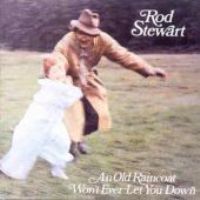| An Old Raincoat Won't Ever Let You Down | ||||
|---|---|---|---|---|
 | ||||
| Studio album by | ||||
| Released | November 1969 (US) February 1970 (UK) | |||
| Recorded | June–August 1969 | |||
| Studio | Lansdowne and Olympic Studios, London | |||
| Genre | British folk rock [1] | |||
| Length | 32:47 | |||
| Label | Vertigo, Mercury, Fontana | |||
| Producer | Rod Stewart, Lou Reizner | |||
| Rod Stewart chronology | ||||
| ||||
| U.S. release title / cover | ||||
 The Rod Stewart Album (Mercury) | ||||
| Singles from An Old Raincoat Won't Ever Let You Down | ||||
An Old Raincoat Won't Ever Let You Down is the debut solo studio album by Rod Stewart. First released in the United States in November 1969 as The Rod Stewart Album,the album peaked at No. 139 on the US Billboard 200 album chart. It was later released in the United Kingdom with the modified title in February 1970. [4] Stewart's Faces bandmates Ronnie Wood and Ian McLagan also appear on the album,along with Keith Emerson,Jeff Beck Group drummer Micky Waller and guitarists Martin Pugh (of Steamhammer,and later Armageddon and 7th Order) and Martin Quittenton (also from Steamhammer).